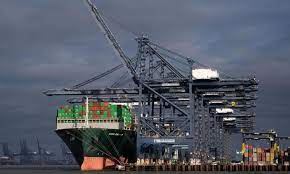UK factories cut production for 11th month in a row amid tensions in Red Sea

London: UK factories entered the new year cutting production and investment in a sign that rising tensions in the Red Sea are harming the ability of manufacturers to end almost a year of contraction.
Factory owners reported import price rises and delays to exports that forced them to reduce output in January for an 11th consecutive month, according to a leading business survey.
However, the UK’s dominant services sector expanded by more than expected, improving the overall outlook for the British economy.
Investors reacted to the survey by pushing the pound higher in the expectation that interest rates would stay higher for longer.
The Bank of England’s monetary policy committee meets on Thursday next week and there is the prospect it could signal that inflationary pressures from stronger growth warrant a delay in the first cut to interest rates.
The pound climbed to $1.27 and interest rate futures showed investors continued to expect four quarter-point cuts in 2024, but with less conviction than earlier in the day.
Chris Williamson, chief business economist of S&P Global Market Intelligence, which compiled the purchasing managers’ index (PMI), said: “Business activity and confidence are being in part driven by hopes of faster economic growth in 2024, in turn linked to the prospect of falling inflation and commensurately lower interest rates.
“However, the surprising strength of growth in January, which has exceeded forecasts, may deter the Bank of England from cutting interest rates as soon as many are expecting, especially as supply disruptions in the Red Sea are reigniting inflation in the manufacturing sector.”
The preliminary reading for the S&P Global/CIPS UK composite PMI, which spans both services and manufacturing companies, rose to 52.5 in January, its highest level in seven months and up from December’s final figure of 52.1. A reading above 50 indicates expansion.
Economists had forecast a slightly smaller increase to 52.2.
A jump in the services index to 53.8 offset a 47.3 figure for the manufacturing sector and a three-month drop to 44.9 for manufacturing output.
A separate survey by the business lobby group the CBI showed on Wednesday that manufacturers were on the back foot going into 2024 with total new orders falling at their fastest pace since July 2020 after an index balance slumped from +2 in October to -13 in the three months to January.
Shipping costs had fallen steeply from early December, according to the Baltic Dry index which tracks the cost of shipping bulk dry goods and is a leading economic indicator. However, that has risen sharply in recent weeks after attacks by Houthi rebels on container ships passing through the Red Sea.
Export sales remained a weak spot, said Williamson, with a sustained decline in the manufacturing sector offsetting modest growth in the service economy.
The S&P survey found that falling inflation in the UK and a reduction in borrowing costs put services companies in a better mood and more willing to hire staff.
The recovery in Britain’s services sector contrasts with weakness in the eurozone, where the composite PMI of 47.9 remained in negative territory in January and was fractionally below analysts’ forecasts.
“The issue for the Bank of England is that inflation is also proving sticky, and the PMI highlights the disruption in the Red Sea,” said James Smith, economist at financial services firm ING. “Today’s data adds to the case for the Bank of England to wait a little longer before cutting rates. We expect a cut in August.”





